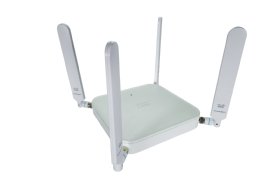
Fotolia
Bye-bye ISR, hello Catalyst 8000 for Cisco SD-WAN
The new Catalyst 8300 Series of routers replace ISRs that customers said were ill-equipped to run the Cisco SD-WAN. Cisco also introduced Catalyst 8500 aggregation routers.
Cisco has introduced a family of Catalyst routers built for the company's software-defined WAN technology. The latest Catalyst 8000 products provide a much better SD-WAN platform than the ISR routers that drew customer complaints in the past.
This week, Cisco released the Catalyst 8300 Series for running an SD-WAN in branch offices and the 8500 Series for companies that need an aggregation router. Cisco calls its 8000 portfolio Edge Platforms.
The 8300 hardware is an upgrade of the Integrated Services Router (ISR) 4400, and the 8500 Series is a refresh of the Aggregation Services Router (ASR) 1001-HX and the 1002-HX. Cisco designed the 8500 for data centers and colocation centers.
Cisco launched the latest routers three years after acquiring SD-WAN maker Viptela for $610 million. Having special routers for the technology will likely please loyal customers unhappy with the software's performance on the ISR.
Adventist Health, based in Roseville, Calif., is one such customer. The healthcare provider tried to run the Cisco SD-WAN on the 18-month-old ISRs in the nonprofit's 340 clinics. (Cisco provided Adventist as a customer reference).
"We love Cisco, but it was almost like [it was saying] 'Hey, let's go ahead and bolt this new technology onto an older router,'" said Ed Vanderpool, IT technical manager at Adventist. "[The 8300] is a new router that is really built for this, instead of trying to do a bolt-on."

Over the next year, Adventist plans to replace all its Cisco routers in the clinics with the 8300 to run the Cisco SD-WAN. Adventist uses ISRs as old as the 1900 Series, released in 2009.
The clinics feed all traffic over MPLS networks to two ISRs running in each of Adventist's 24 hospitals. The nonprofit plans to use the Cisco SD-WAN to introduce broadband as a secondary link between the clinics and the hospitals. Adventist doesn't plan to replace the ISRs in the hospitals or the ASR running in each of its two data centers, which receive all the network traffic from the hospitals.
Catalyst 8000 specs
The 8300 Series comprises four models with six built-in Ethernet ports of 1 Gb or 10 Gb, delivering 2 Gbps or 5 Gbps of SD-WAN throughput. The 8500 Series consists of two models with options for 1/10/40/100 GbE ports.

The devices run the IOS-XE network operating system and include an Intel x86 CPU with up to 32 GB of DRAM in the 8300 and 64 GB in the 8500. The computing platform runs container-based microservices for analytics apps and other extensions from Cisco or its partners.
Companies can integrate the hardware with Cisco Umbrella, a cloud-based service that searches for threatening internet activity.
Cisco also introduced the Catalyst Cellular Gateway with the latest routers to connect the new hardware and ISR and ASR devices to 4G LTE. Companies can use the gateway to make a cellular network either as a backup or a primary SD-WAN link.
Finally, Cisco introduced the Catalyst 8000V Edge routing software, which runs on an x86 platform. The product brings the Catalyst 8000 family's functionality into private cloud environments and public clouds, including AWS, Microsoft Azure or Google Cloud. Cisco plans to release the 8000V in December.








